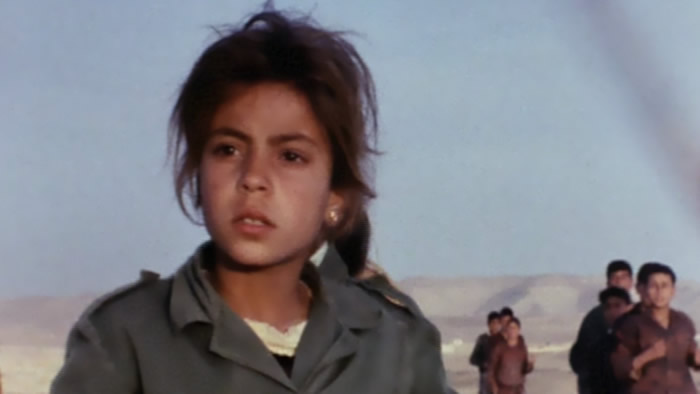Here and Elsewhere
In 1970, Jean-Luc Godard, along with Jean-Pierre Gorin and the Dziga Vertov Group, was commissioned by Al Fatah, the militant Palestinian group, to shoot a documentary. When the film was approximately two-thirds complete, production was halted since many of the Palestinians they had been filming had been killed. Years after the disintegration of the Dziga Vertov Group, Godard and his new collaborator Anne-Marie Mieville, whom he would work with through the 1990s, re-edited this footage into a cinematic essay exploring the failure of the original to address the reality of the images it presents.

Years after Godard and his new collaborator Anne-Marie Mieville, whom he would work with through the 1990s, re-edited this footage into a cinematic essay exploring the failure of the original to address the reality of the images it presents titled Ici et Ailleurs: Here and Elsewhere.

In reshaping the original footage, Godard and Mieville are able to bring the “here”, in this case a working-class French family watching TV, together with the “elsewhere”, Palestine, in a vibrant discussion of the nature of the image and how they come to define our reality. Integral to this discussion was the idea that the images in the original film failed in their political objective since they added up to zero. As Godard says, since in a film, images are projected, not simultaneously, but one after another, they cannot form a cohesive whole because the next image replaces the importance of the first.

Like sound and image, now and then, or life and death, here and elsewhere essentially define one another dialectically, through a series of relays and exchanges — a process that for Godard and Miéville is indistinguishable from their responsibility to their subject.
A clip from “Here and Elsewhere” (Ici et ailleurs, 1976) by J.L. Godard
The new exhibition at the New Museum in New York City – opening tonight July 16 – borrows its title from this 1976 film-essay by French directors Jean-Luc Godard, Jean-Pierre Gorin, and Anne-Marie Miéville. The exhibition documents the work of 45 contemporary artists of Arab origin, marking the first-ever museumwide group show of Arab artists in New York City. The exhibition pays particular attention to the position and role of the artist in the face of historical events.
Artists such as Hrair Sarkissian, Khaled Jarrar and Hassan Sharif undertake experimental approaches to archival material, rewriting personal and collective traumas, and weaving fragments both real and imagined into their work.
Sarkissian’s photos of public squares in Syrian cities depict sites similar to the one where, as a child, he witnessed a criminal execution one day in the early morning.
Sharif, a pioneering conceptual artist in Dubai, works by accumulating surplus materials and found objects, but in contrast to the archaeological pursuits of other artists, his catalogues of manufactured goods reflect on globalized production and consumption.
“Here and Elsewhere” is on view July 16 to Sept. 28 at the New Museum, 235 Bowery, New York

